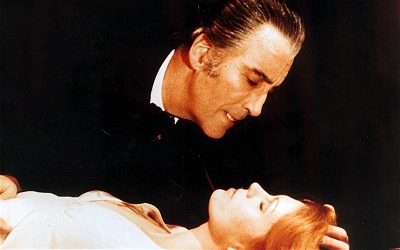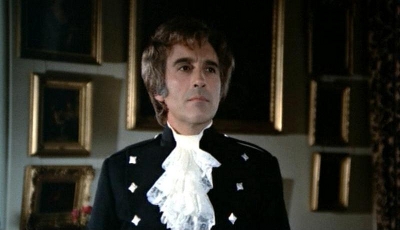|
Sir Christopher Lee (1922-2015)

The great Christopher Lee has
passed away at the age of 93. Step-cousin of Ian Fleming and Scaramanga
in The Man with the Golden Gun, he had an incredible 250+ screen
credits to his name when he died. Lee was born in Westminster in 1922,
the son of a Boer War veteran and Italian contessa. During World War 2
he was an intelligence officer in the Long Range Desert Patrol missions
which formed the basis of the SAS. He had actually volunteered for the
1939/40 Finnish "Winter War" (when the Soviet Union invaded Finland and
despite outnumbering the Fins in terms of soldiers, tanks and aircraft
to a preposterous degree had a nightmarishly difficult campaign) prior
to North Africa. He was also an RAF pilot until an eye injury grounded
him. You honestly couldn't make up Lee's life if you tried. James Bond
and Indiana Jones had nothing on him.
The North African campaign
defeated the Africa Korps made famous by Rommel and - crucially -
stopped the Middle Eastern and Persian oil fields from falling into
Axis hands. It also laid the foundation for the Allied invasion of
Italy. Lee took part in this campaign too and climbed Mount Vesuvius
three days before it erupted. He was at the Battle of Monte Cassino and
also served in Churchill's Special Operations Executive - an elite
organisation involved in espionage, sabotage and reconnaissance in Nazi
dominated Europe. The unofficial name for the SOE was The Ministry of
Ungentlemanly Warfare. The SOE's activities are still classified and so
Lee would never speak about his time serving with them. When the war
ended, the multi-lingual Lee hunted Nazis for the Central Registry of
War Criminals and Security Suspects before turning his hand to acting
at the age of 25.
He had the first of his many
film credits in 1948's Corridor of Mirrors (directed by Terence Young)
and his path would eventually lead to Hammer Studios and his iconic
portrayal of Dracula. Because Lee was such a commanding (6'5 in
height) and polished presence it only took some contact lenses, a cape
and a bit of make-up magic to turn him into a memorable Prince of
Darkness. I enjoy The Creeping Flesh too, this one featuring Lee and
Peter Cushing as brothers who become embroiled in a mystery involving a
strange skeleton Cushing's character finds in New Guinea. The Devil
Rides Out is also worthy of your time as Lee got to play the hero for
once, a sympathetic Duke who must protect people from a Satanic cult.
While everyone has heard of
Hammer, there was another British studio who did a sterling trade in
horror pictures in the sixties and seventies. Amicus Productions were
created by Americans Milton Subotsky and Max J Rosenberg and - inspired
by Hammer's fame - they gatecrashed the thriving British horror scene.
At the time the British Government had an incentive that forced cinemas
to show a quota of British made films and also offered tax breaks to
British based productions. There was money to be made if you were
shrewd enough and the Amicus legacy became a memorably enjoyable and
colourful one.
Amicus were heavily influenced
by the classic 1945 Ealing portmanteau chiller Dead of Night and found
their niche with the anthology horror film. Four or five short tales
within one film containing many famous guest stars - including
crossover names from Hammer like Peter Cushing and Christopher Lee.
Amicus largely eschewed the period and Gothic trappings of Hammer and
their anthology films were set in the present day. Because of this they
remain a lot of fun now with the obviously dated fashions and
backdrops. Lee featured in two of the Amicus anthologies and both films
are great fun and worth seeking out if you've never seen them before.
In 1964's Dr Terror's House of Horrors
(by the way, look out for a young and then unknown Donald Sutherland in
this film) Lee is in a segment called Disembodied Hand as a pompous and
vitriolic art critic named Franklyn Marsh who plots to dispense with an
artist named Landor (played by Michael Gough). Marsh is a celebrity
critic who has made himself famous for his rants against modern art,
with Landor a particular target. Landor gains his revenge by having a
new piece of work brought out for Marsh to evaluate. "Now this is quite
a different matter," he says when he looks at the work, praising it as
wildly as he trashed Landor's work. An amused Landor reveals the artist
was a chimpanzee (!) and Marsh is suitably humiliated. Disembodied Hand
gains a fantastic boost from Lee, who is gloriously snotty and panto
villain as Marsh. It is always tremendous fun to be in his company as
things go from bad to worse for Marsh.
In 1970's The House That Dripped
Blood, Lee is in the story called Sweets To The Sweet and stars as John
Reed, a rather stern and unemotional man who moves into the spooky
house of the title with his young daughter Jane (Chloe Franks). Jane's
new home tutor Ann Norton (Nyree Dawn Porter) however finds herself
increasingly troubled by the strict martinet Reed's cold refusal to let
Jane go to school, see other children, or even have toys. Although it
builds to a somewhat predictable ending (you'll surely guess the
pay-off) there is much to enjoy here, most notably the performance of
Lee who is again at his snotty, sneering best as the strict father who
seems to be incredibly wary of and cold with his apparently innocent
daughter. Lee and his great friend Peter Cushing were wonderful at
lending class and gravitas to those old horror pictures.
Another Lee performance worth
catching is in Billy Wilder's The Private Life of Sherlock Holmes, a
film that flopped upon release but is now held in high regard. One of
the strengths of the film is the casting of Robert Stephens as Sherlock
Holmes but Christopher Lee is a real treat too as Holmes' possibly even
more brilliant older brother Mycroft - who he makes enjoyably pompous
and crisp in his usual fashion. And Lee was also well cast as Sir Henry
in Hammer's enjoyably melodramatic spin on The Hound of the
Baskervilles starring the great Peter Cushing as Holmes.

Lee's favourite role was that of
the urbane and sinister Lord Summerisle in the cult 1973 'folk horror'
The Wicker Man. This was his most satisfying part and it was written
especially for him. The most extraordinary thing about this film is
that it made almost no impact whatsoever at the time. The unhappy
studio couldn't make head nor tail of it and chopped the film to
pieces. All very perplexing given how good The Wicker Man is.
Thankfully, it managed to survive these rocky origins and establish
itself as a bona fide British cult film.
Other notable Lee performances
included The Mummy, City of the Dead, and Richard Lester's
swashbuckling seventies comedy The Four Musketeers. What could have
been the ultimate Christopher Lee cult film didn't happen though
because he turned down the role of Dr Loomis in John Carpenter's
classic Halloween. He apparently later told Carpenter it was one of his
biggest regrets.
Lee was a step-cousin to Ian
Fleming and used to play golf with him so it was perhaps inevitable
that he would end up in a Bond film given the connection. He turned
down the part of Dr No in the original 1962 Bond film despite great
interest in him doing it. Although Lee's superb performance in The Man
with the Golden Gun ranks him highly amongst Bond villain actors the
film itself didn't do terribly well and was seen at the time as
evidence that the Bond series might have passed its sell by date. The
topical plot about the seventies energy crisis dated it fairly quickly
but the presence of Lee and some stylish flourishes have helped to gain
it a good few fans over the years.
Lee continued to work
throughout his long life and new generations of cinemagoers were able
to enjoy him take on parts in blockbuster franchises like Star Wars and
The Lord of the Rings. Lee was a huge Tolkien fan and even bumped into
the famous author once in an Oxford pub. He always wanted to play
Gandalf but given his age and skill at playing menacing villains (Fu
Manchu, Rasputin, Rochefort etc), Peter Jackson decided to cast him as
Saruman. It was great to see Lee, so many decades removed from the
Hammer years, still relevant and capable of such memorable performances.
You could probably carry on
discussing Lee's life and work for an eternity. He once had to get
permission from the King of Sweden to get engaged and released a death
metal album in his nineties! It's a cliche to say we'll never see their
like again when someone dies but in the case of Christopher Lee it
feels more like a statement of fact than anything. What a back
catalogue he left behind for us and future generations to explore and
enjoy.
- Jake
c 2015
Alternative 007
|

|


